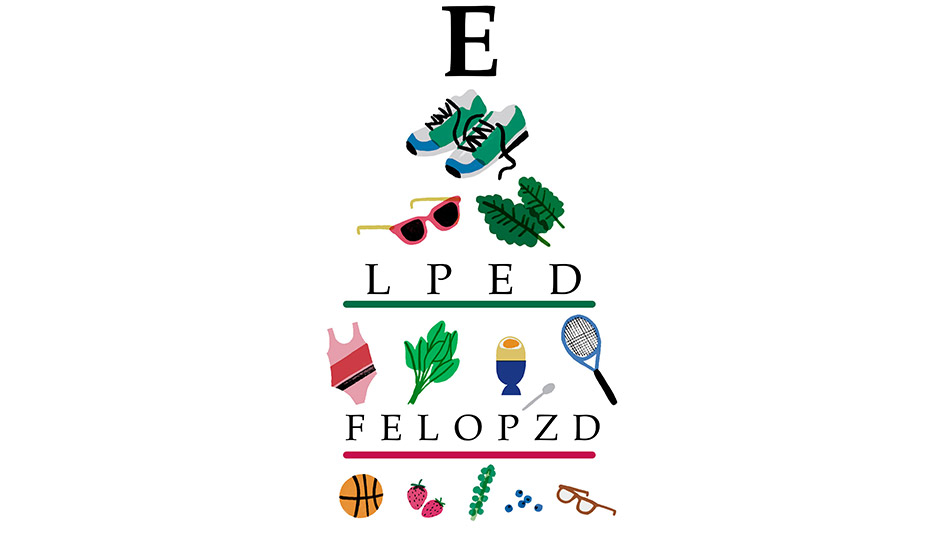4 Ways to Actually Improve Your Eye Health
More than 20 million American adults have experienced some form of vision loss. Here's how to see your way to healthy eyes.

Illustration: Charlotte Trounce
According to recent polls, we fear losing our sight more than any other sense—and rank blindness among the four worst diagnoses we could receive, right up there with cancer, Alzheimer's and HIV. Yet many of us don't prioritize the health of our eyes, even though there are simple, everyday steps we can take to help keep our vision in the clear. Start with these:

Eat For Your Eyes
Don't worry, I'm not going to tell you to add carrots to every meal. You can enjoy a range of foods that are good for your eyes if they're rich in lutein and zeaxanthin, two antioxidants found in veggies like dark leafy greens (think spinach and kale), Brussels sprouts and corn. In one large-scale study, researchers discovered that women whose diets contained the highest amounts of these eye-healthy nutrients were 32 percent less likely to develop cataracts than those who ate the lowest.

Work It Out
Research suggests that exercise may help prevent glaucoma, which can damage the optic nerve. A British study of more than 5,600 adults found that those who exercised regularly (more than an hour each day) were 25 percent less likely to have low blood flow to their eyes—circulation issues are thought to be a cause of glaucoma—than their more sedentary counterparts.

Grab Your Shades
You know not to go outside without sunscreen—well, don't forget your sunglasses, either. The same UV rays that burn your skin and speed aging can also do serious damage to your eyes. In fact, UV exposure is responsible for an estimated 5 to 10 percent of cataract cases. The most important label to look for when scoping out a pair of sunnies: 100 PERCENT UV PROTECTION. That's the only way to know you're getting the best coverage while you're out in the sun.

Blink
Our obsession with technology has introduced a new threat: digital eyestrain. While one symptom, dry eyes, is normally no more than a nuisance, a 2014 study in JAMA Ophthalmology suggests that staring at a screen all day could lead to changes in the eye similar to those in patients with dry eye disease, a more serious condition in which the eye doesn't produce tears properly (or they evaporate too quickly). Researchers discovered that as screen time went up, the level of a lubricating substance found in tears went down. Why? The participants may have blinked less. Studies have shown that we normally blink 15 to 20 times per minute, but when we're using digital devices, that rate can be cut in half. Put a sticky note on your computer to remind yourself to take a break and blink!
Mehmet Oz, MD, is the host of The Dr. Oz Show (weekdays; check local listings).

Eat For Your Eyes
Don't worry, I'm not going to tell you to add carrots to every meal. You can enjoy a range of foods that are good for your eyes if they're rich in lutein and zeaxanthin, two antioxidants found in veggies like dark leafy greens (think spinach and kale), Brussels sprouts and corn. In one large-scale study, researchers discovered that women whose diets contained the highest amounts of these eye-healthy nutrients were 32 percent less likely to develop cataracts than those who ate the lowest.

Work It Out
Research suggests that exercise may help prevent glaucoma, which can damage the optic nerve. A British study of more than 5,600 adults found that those who exercised regularly (more than an hour each day) were 25 percent less likely to have low blood flow to their eyes—circulation issues are thought to be a cause of glaucoma—than their more sedentary counterparts.

Grab Your Shades
You know not to go outside without sunscreen—well, don't forget your sunglasses, either. The same UV rays that burn your skin and speed aging can also do serious damage to your eyes. In fact, UV exposure is responsible for an estimated 5 to 10 percent of cataract cases. The most important label to look for when scoping out a pair of sunnies: 100 PERCENT UV PROTECTION. That's the only way to know you're getting the best coverage while you're out in the sun.

Blink
Our obsession with technology has introduced a new threat: digital eyestrain. While one symptom, dry eyes, is normally no more than a nuisance, a 2014 study in JAMA Ophthalmology suggests that staring at a screen all day could lead to changes in the eye similar to those in patients with dry eye disease, a more serious condition in which the eye doesn't produce tears properly (or they evaporate too quickly). Researchers discovered that as screen time went up, the level of a lubricating substance found in tears went down. Why? The participants may have blinked less. Studies have shown that we normally blink 15 to 20 times per minute, but when we're using digital devices, that rate can be cut in half. Put a sticky note on your computer to remind yourself to take a break and blink!
Mehmet Oz, MD, is the host of The Dr. Oz Show (weekdays; check local listings).



